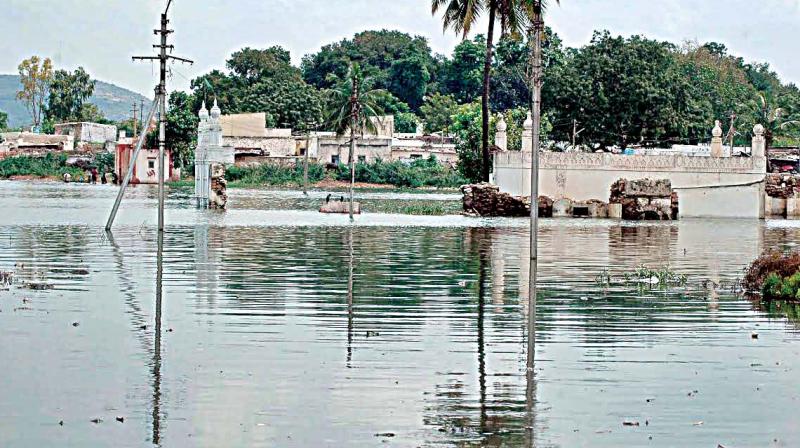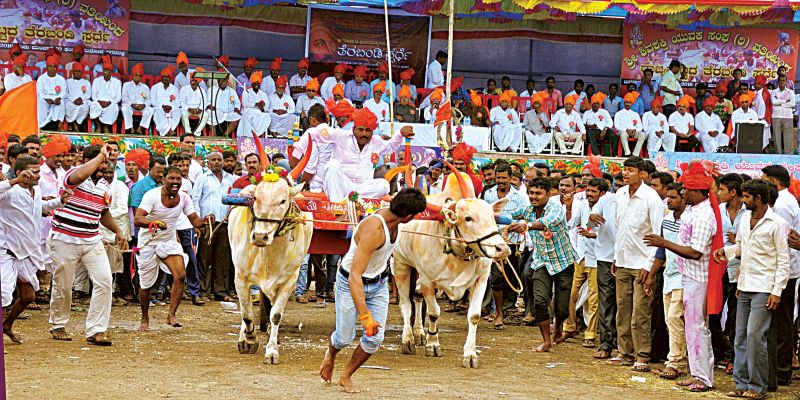Sunday story: Bagalkote Dammed', priceless traditions lost
Two bovines belonging to different landlords would be decked up and provoked to run up to the main entrance of the village.

Their gods are lost, their land inundated and their unique sports are on the verge of extinction. All because the swirling backwaters of the mighty Almatti dam have swallowed them all up, leaving the hapless farmers of 192 villages in Bagalkote and Vijayapura districts wondering how traditions dating back thousands of years, could disappear so fast.
There was a time when landlord Peerappa Shirur, now fifty-years-old, used to celebrate the popular ‘Kar Hunnime Kari’ with fervour in his native hamlet of Hadarihal in Bagalkote. More than ten thousand people from surrounding villages used to witness the event as the tradition portrayed how strong the village was with people believing that the outcome of the game, was a sign of a bountiful monsoon or otherwise!
It all happened two decades ago but villages can never forget how they lost their lifeline in the backwaters after implementation of Upper Krishna Project, which saw the biggest land acquisition for any irrigation scheme in the country.
Old-timers recall the wonderful games they used to play. Two bovines belonging to different landlords would be decked up and provoked to run up to the main entrance of the village. One represented the kharif season and the other, rabi. Farmers believed that the bovine which came first signalled a good monsoon and crop for the season concerned.
Every household in these villages had cattle as agriculture was the only occupation Cattle rearing is now a distant memory as half the population in each village has moved to rehabilitation centres set up by the government after construction of the dam.
“We used to observe Kar Hunnime Kari on the full moon day of Jyestha (June) by worshiping bullocks and agricultural implements. Now, several traditions have died out as farmers have moved to rehabilitation centres. Joint families have disintegrated, families have settled in nearby Bagalkot town and adopted an urban lifestyle,” said Peerappa Shirur.
 As part of a traditional game, two bulls belonging to different landlords are decked up and made to run till the entrance of the village
As part of a traditional game, two bulls belonging to different landlords are decked up and made to run till the entrance of the village
Another reason for the disappearance of tradition is the preference for tractors and modern equipment instead of cattle. The only way farmers can ensure the tradition survives is by renting cattle from other regions and continuing the games. And most of the compensation they received for land has been spent on lavish marriages.
“Our joint family had more than hundred acres of farm land before it was acquired for Upper Krishna Project. The government paid a mere Rs 4,000 per acre as compensation in 1990. Now, we own only 12 acres of land and our children are settled in urban areas. All we have are memories of a glorious period when we celebrated rural traditions and sports with zeal,” said seventy-two-year-old farmer, B.R. Patil of Koppa SR village.
Even the popular ‘Charaga’ tradition, which is about giving back a little of what the farmers has earned from Mother Earth during the harvesting season, is on the wane. The absence of agricultural activity and migration have dampened the spirit of farmers during Charaga which is celebrated in November-December
It was a time when lakhs of farmers would visit the fields to worship land at the time of the harvest. The family would travel to the land in decorated bullock-carts carrying food while women would travel in a separate Savari cart with a hood. Priests would take part in the worship rituals after which they would play games and take part in cultural programmes.
“Farmers used to prepare many sweets and offer it to the idol of the Goddess under the tree in the field as a thanksgiving to the rain god for a good crop. Now, the spirit to celebrate is no longer there with farmland lost. We even had weightlifting contests and goat fights, now our children are employed in nearby sugar factories,” explained a farmer of Gundanapalle village, Gurulingayya Hiremath.
The changing economics of agriculture has contributed to the disappearance of rural traditions. Agricultural activity is not as popular as it used to be because of the high cost of labour and farm workers always have the option of availing government facilities under MGNREGS or the subsidised rice scheme.
And once more than one lakh acres of farmland is submerged after the raising of Almatti dam’s height to 524 metres, there would be nothing left. Priceless traditions and ways of life evolved over a millennium, will remain just a fading memory in the mind of the farmer. There is a price to pay for progress but is this not a price too high?
Forum for compensation and revival of traditions
Displaced people of Bagalkot and Vijayapur, who will lose land for the third phase of Upper Krishna Project (UKP), have formed a forum to seek adequate compensation for the land they stand to lose after the government increases the height of Almatti dam. This is expected to submerge 22 villages and 131 lakh acres of land in Vijayapura and Bagalkot districts and ten wards of Bagalkot city. The villagers want more compensation to buy alternative land and continue agriculture.
The farmers had launched a movement 16 years ago seeking adequate compensation that prompted then chief minister, J.H. Patel to form a committee to fix the price for land. Now, the farmers are set to revive the movement by putting forth 31 demands.
“Nearly two hundred villages, which were rehabilitated under the first phase, are still reeling because of lack of basic amenities. We are demanding compensation of Rs 30 lakh per acre for dry land and Rs 40 lakh for irrigated land as the compensation being offered under the new Land Acquisition Act is not acceptable. Displaced people of the three districts will launch a movement and political leaders cutting across party lines will take part,” said Vasanna Desai, president of Upper Krishna Project Rehabilitation Committee.

